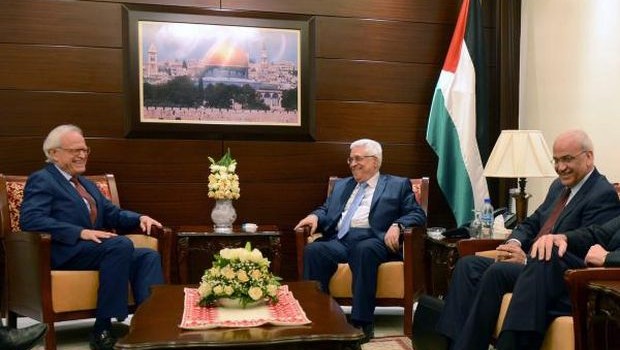
A photograph supplied by the Palestinian Authority shows special US special envoy Martin Indyk meeting Palestinian president Mahmoud Abbas (C) and Saeb Erekat (R), the Palestinian chief negotiator, at the Palestinian Authority’s headquarters in the West Bank town of Ramallah on August 11, 2013. (EPA/THAER GHANAIM )
The current round of negotiations has been kept deliberately low-key, with meetings beginning without any prior notice or protocol. No pictures were taken and no statements issued before or after the discussions.
The approach is understood to be the work of US secretary of state John Kerry, who has asked both parties to keep negotiations discreet in the hope of minimizing leaks over the next 9 months of talks in Jerusalem and Jericho.
The negotiations are set to continue despite a recent decision by the Israeli government to approve the expansion of existing settlements in the West Bank.
The secretary of the Executive Committee of the PLO, Yasser Abed Rabbo, said: “If settlements continue, negotiations will collapse.”
Speaking to Palestinian official radio station, he added: “No one, not even Kerry, can sell us illusions. It is an illusion to expect negotiations to continue long as there are growing settlements.”
Just hours before the round of negotiations commenced, Israeli housing minister Uri Ariel told Israeli radio: “We will build thousands of homes in the coming year in the West Bank,” adding, “No one dictates where we can build.”
Ariel’s statement came two days after the Israeli government approved the construction of 1,200 housing units in Israeli settlements in Jerusalem and the West Bank.
This prompted chief Palestinian negotiator Saeb Erekat to threaten to boycott negotiations before they begin. However, Palestinian sources told Asharq Al-Awsat that he was overruled by President Mahmoud Abbas, also known as Abu Mazen.
Kerry contacted Abbas late on Tuesdsay to discuss this “crisis,” asserting that the US considers all settlements illegal. Kerry said that Abbas is convinced that only negotiations can solve the conflict.
However, the Prime Minister’s Office in Israel responded to the criticism of the decision on Wednesday, saying: “All construction projects have been approved by the government and are located on the borders of Jerusalem and inside the major settlement blocs that will remain under Israeli sovereignty under any circumstances. So, the construction projects should not affect the final peace map in any way.”
The United Nations officially announced that Secretary-General Ban Ki-Moon will begin a tour of the region today to support the peace talks. It is believed that his trip will begin in Amman, where he will meet King Abdullah II of Jordan, then move to Ramallah to meet President Mahmoud Abbas and his prime minister, Rami Hamdallah. Next, he will meet Israeli president Shimon Peres and prime minister Benjamin Netanytahu in Jersualem.
UN spokesman Eduardo del Buey said Ban is visiting the region “support” direct negotiations between Israelis and Palestinians, as the UN a partner within the quartet involved in the Middle East peace negotiations, along with the US, Russia and the European Union.
The spokesman added that the secretary-general will also meet US special envoy to the peace process Martin Indyk.
Palestinian sources told Asharq Al-Awsat that Ban Ki-Moon’s visit is important since he is visiting the new Palestinian state for the first time, adding that “Palestinian authorities will discuss with him the role of the international quartet in the peace process.”
While negotiations enjoy international support, they are deeply controversial among Palestinians. Several Palestinian factions, including members of the the PLO, have confirmed their refusal to return to the negotiating table with Israel.
In a joint press conference, these factions called on the negotiating team to withdraw from the “futile” talks, claiming that they are taking place “without public and national support.”
A member of the executive committee of the PLO, Taysir Khalid, said he supports the idea of forming a national coalition against the Palestinian authority’s negotiations with Israel.
